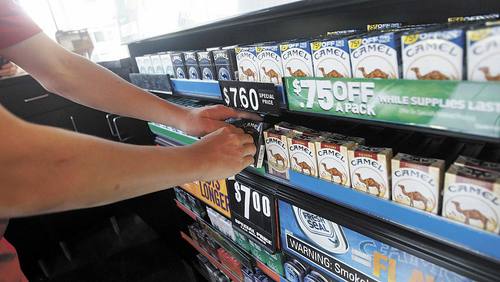Bismarck Tribune: Legislators need to get tobacco bill right
Bismarck Tribune Editorial Board:
On the surface, a bill to raise tobacco taxes would seem a no-brainer to many North Dakotans.
The state ranks 46th nationally in tobacco taxes at 44 cents per pack, ahead of Alabama, Georgia, Louisiana and Virginia.
Supporters of a higher tax argue it will deter young people from picking up the habit, nudge smokers to quit and provide more money to the state.
House Bill 1421 would raise the state’s cigarette tax to $1.54 per pack and increase the excise tax on other tobacco products from 28 percent of the wholesale purchase price to 43.5 percent.
There have been efforts to raise tobacco taxes since 1993, with the latest failed attempt in 2013. A hearing this week on the bill pitted health care officials against business interests.
Mike Rud, president of the North Dakota Petroleum Marketers Association, suggested the state shouldn’t tamper with an economy that remains robust. He said his association opposes the bill, and that increasing the tax would make it more difficult for retailers along the Montana and South Dakota borders, states where the taxes would be lower.
However, Dr. Eric Johnson, of Grand Forks, noted the state gets a flunking grade from the American Lung Association when it comes to tobacco taxes.
Rep. Jon Nelson, R-Rugby, said the bill is intended to stop young preople from smoking, while generating an estimated $103.5 million in new revenue in the 2015-17 biennium.
Supporters of the bill expect to have it both ways. They predict the higher taxes will prevent approximately 7,500 people younger than 18 from smoking and prompt an estimated 8,000 adult smokers to quit. They also see a possible $300 million in savings in future health care expenditures. It’s likely fewer smokers will result in fewer health problems and reduce the impact on health care. Plus supporters expect the $103.5 million in new revenue.
Fewer smokers is a laudable goal — there’s no doubt that tobacco poses a health risk and increases medical costs for everyone. The bill’s health benefits should be the focus of legislative action — we shouldn’t be looking at the dollar signs.
Smoking remains legal, though where smoking can occur has been limited. Raising taxes for health reasons has merit, but raising them to punish people doesn’t.
Under the bill, 60 percent of new revenue would go toward health-related programs in the state’s Community Health Trust Fund. The rest would go to local communities for health-related programs.
Designating the money for health programs shouldn’t translate into funding more anti-smoking campaigns that already are well-financed. There are more deserving programs than can be counted. The Legislature needs to ensure the money goes to the right programs.
North Dakota needs to do everything it can to prevent more people from smoking and to encourage smokers to quit. Lawmakers need to take a close look at HB1421 to be sure it achieves those goals. It shouldn’t be done to create a new revenue stream.
Done correctly, HB1421 should be approved. Improving the health of the state’s residents should be the goal of all North Dakotans.


